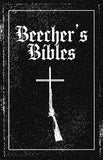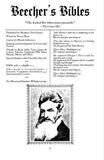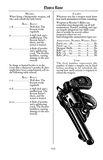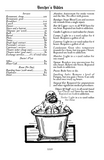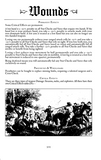Beecher's Bibles
32 pages black & white.
Players in Beecher’s Bibles are Jayhawkers, Red Legs, Free-Staters; proud abolitionist militant guerilla bands in 1850s Kansas, clashing with the pro-slavery forces of border ruffians and bushwhackers. A "Beecher's Bible" was the name given to the breech-loading Sharps rifle that was supplied to and used by anti-slavery forces during the Bleeding Kansas period (1854–1860). The name was inspired by the words and deeds of abolitionist minister Henry Ward Beecher of the New England Emigrant Aid Society.
This newly-updated version of Beecher's Bibles is based on the Panic Engine by Sean McCoy and features a new character creation system, rules for gruesome injuries and morale-breaking shootouts, travel, camping, scrounging, and survival in a hostile frontier. It also features Aim Small, Miss Small: a short introductory adventure based on the real-life arrest and freeing of abolitionist Jacob Branson from the clutches of pro-slavery Douglas County Sheriff Samuel J. Jones.
Henry W Beecher believed that the Sharps Rifle was a truly moral agency, and that there was more moral power in one of those instruments, so far as the slaveholders of Kansas were concerned, than in a hundred Bibles. You might just as well...read the Bible to Buffaloes as to those fellows who follow Atchison and Stringfellow; but they have a supreme respect for the logic that is embodied in Sharp's rifle.
-New York Tribune, February 8, 1856
According to local legend, shipments of Sharps carbines were disguised by being shipped in boxes marked ‘Bibles.’ Beecher himself contributed funds for the purchase of Sharps carbines and, after the interception of shipments by pro-slavery men, is said to have issued carbines and real Bibles to individual abolitionists bound for Kansas. The Beecher family was one of the leading abolitionist families in the country, and Henry Ward’s sister Harriet Beecher Stowe went on to publish the anti-slavery novel Uncle Tom’s Cabin in 1852.






